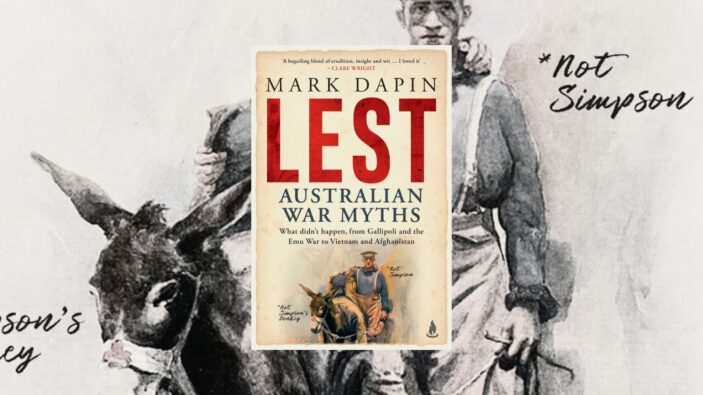
Just as the world seems to be again on the verge of WWIII, Lest serves as a timely reminder of previous wars and military operations the ADF were part of. Mark Dapin, who has a PhD in military history, adopts a fresh approach of debunking popular myths around Australia’s military record, emphasising the cultural shifts and impact these events had on Australians throughout the years.
Some of Mark Dapin’s previous works are the acclaimed novels King of the Cross and Spirit House, with King of the Cross winning the Ned Kelly Award for Best First Fiction in 2010. The UK-born Australian is also known for his contributions as a journalist (Good Weekend Magazine), screenwriter (Stan’s Wolf Creek 2) and historian.
As a lover of history, and a person who can claim to know a thing or two about military service, I was interested to read Lest. But, even for those of you who don’t usually take interest there’s something here for you. For a book about brutal wars Lest is a very light read, filled with humour, fun facts and anecdotes. In fact, what made the book stand out for me was Dapin’s wit, and his commitment to extract the truth out of the piles of history that are doomed to be constantly re-written to fit popular culture.
Fittingly, Dapin kicks things off by talking about the myths surrounding ANZAC Day, dedicating the first few chapters to the Western Front throughout WWI and WWII. He then slowly moves through all the different conflicts of the 20th Century, before focusing somewhat on Vietnam. Though this is to expected, with the conflict being the subject of Dapin’s PhD.
Though about half way through Dapin takes what seems to be an extra comic pause to discuss The Emu War (the infamous battle between the military backed wheat farmers of WA and a plague of Emus) which I found especially entertaining.
Lest also sees Dapin exploring different social and cultural phenomenas, and their link to Australia’s military past, such as homosexuality within the ADF, the experience of the Australian POWs in South East Asia during WWII, RSL politics and the reception of Vietnam veterans.
Overall, I enjoyed reading the work as both a thought provoking and philosophical text, as well as an educational piece filled with facts, quotes and a fairly linear re-telling of historical events. For example, reading about Gallipolli, I loved Dapin’s input on the past and present Turkish lens of the conflict, as well as the Australian-tourist-friendly version that’s now showcased in modern Turkey.
Despite the book’s debunking premise, in the chapter, ‘The Myths of the Dardanelles Campaign’, Dapin points out that some myth busting is a bit too picky. He admits that it is ‘obsessive’ to check whether Simpson and his donkey saved 300 people or the more realistic 180… Also seeing that Simpson himself (according to Dapin) is likely not one particular hero, but rather a collective memory passed on through many testimonies, do those particular details really matter? Why do we need to be sure of these exact truths? In fact, amongst other questions, I feel that Lest asks is to question the role of history as a whole? If a better story serves a better future, should we disregard the truth? Dapin’s answer is that “history makes little sense if it is overlooked.”
In, the chapter ‘The Myths of the POWs’ Dapin proves how far remembered history can be from the reality. Here the context is discussing the POW’s experiences in Changi, but throughout the whole book Dapin repeatedly demonstrates how Hollywood, as well as post war commemorations, have lost so much of the truth in the making of a good story. It’s at times amusing and at times very tragic, and to me it really pressed the question: if this is how much history has been misconstrued in the age of camera and radio communication what will become of our modern day history in the era of social media and AI? Somehow I have the depressing feeling I will be bitterly arguing against my grandchildren’s made up history books in fifty years time as I am too much a fan of knowing the truth. We sure live in an eventful time and there is way too much space for myth making!
The final chapter, where Dapin is talking about more recent wars, is where he lost me a bit. Personally, it felt like he went on a little anti-war rant, assuming the worst about soldiers who were most likely doing a very hard job, with the best intentions, for little reward. I guess it was expected to see some of that in an anti-militarism publication. However, as someone who is ex-military I found it a bit less fair and balanced than the other chapters. Maybe for some wars it is still too soon, and too fresh in the memory, to make jokes.
That being said, it would be almost impossible to find a reader who would agree with every point in a book that tackles so many difficult subjects. And, I still must say, I found Lest to be a very enjoyable read. Dapin gives a good summary of events, along with varied perspectives and humorous facts, making history a pleasure to learn in the process. So, if you are interested in Australian war history and want to gain some insight on events that happened, didn’t happen or could have happened, then this book is for you!
![]()
![]()
![]()
![]()
![]()
FOUR STARS (OUT OF FIVE)
Lest: Australian War Myths by Mark Dapin is available now from Scribner Australia. Grab yourself a copy from a local bookshop HERE.
